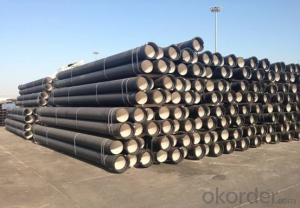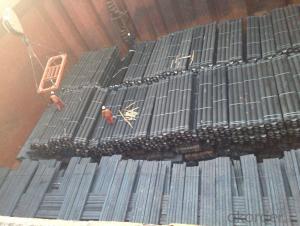DUCTILE IRON PIPES C Class DN300
- Loading Port:
- China Main Port
- Payment Terms:
- TT OR LC
- Min Order Qty:
- -
- Supply Capability:
- -
OKorder Service Pledge
OKorder Financial Service
You Might Also Like
Ductile Iron Cast Pipe is without any defects compare with tradition casting tech, which has many advantages particularly as follow:
(1) High density. In the "vertical upward casting" process, the melt iron of centre liquid column in center crystallizer is continuously feeding for volume shrinkage caused by condensation tube at outer circumference , which lead to be free of shrinkage porosity.
(2) High purity. When melt iron pouring, the mixed impurities such as gas, dross, sand grain which are lighter than melt iron could be eliminated at furnace mouth, its impossible to enter into the crystallizer through the channel, so the melt iron into the crystallizer is very pure.
(3) Strength with toughness. The cooling speed provided by continuous crystallizer is 30 times than sand casting and 5 times than centrifugal casting, and doesn't produce white iron, the eutectic cell volume of continuous cast iron is one eighth to one tenth compare with traditional cast iron. The density of graphite nodule in ductile iron can reach 300-700 pcs/mm2. Therefore, all reason above improve the strength and toughness of continuous cast iron.
(4) Free machining. The high speed cooling make the hardening phase (such as boride, steadite) not appear like reticular, massive or thick, but diffuse like fish bone and pane in shape, moreover, there are tiny graphite flakes inlaid hardening phase. It's free machining in BrinellHardness the range of 250-300HB. However, the Brinell Hardness of 250 is top limit to common metal materials.
(5) Uniform composition of tube wall. The convection mixing of liquid column caused by marching type drawing in crystallizer make the composition of tube wall well-distributed, and concentration gradient very little.
(6) High productivity. To the wall thickness of tube under 10mm, the speed of continuous casting is 1 meter/min, to the wall thickness of tube under 20mm, the speed of continuous casting is 0.5 meter/min, which is high efficiency that centrifugal or other casting tech couldn't reach.
- Q:Are ductile iron pipes suitable for potable water distribution systems?
- Ductile iron pipes are well-suited for the distribution of drinking water in potable water systems. Ductile iron, a form of cast iron, is renowned for its strength and durability, making it an ideal choice for transporting drinking water. These pipes possess corrosion resistance, a crucial factor in preserving the safety and quality of potable water. Moreover, their smooth inner surface helps prevent the accumulation of sediments and biofilms that can negatively impact water quality. Furthermore, they can withstand high pressure and temperature fluctuations, rendering them suitable for diverse potable water distribution systems. In summary, ductile iron pipes are a dependable and widely employed solution for ensuring the provision of safe and uncontaminated drinking water to communities.
- Q:Can ductile iron pipes be used for underground storage of hazardous materials?
- No, ductile iron pipes should not be used for underground storage of hazardous materials. Ductile iron pipes are commonly used for water and sewage systems due to their durability and corrosion resistance. However, they are not designed to withstand the specific requirements and potential hazards associated with storing hazardous materials underground. When it comes to underground storage of hazardous materials, it is crucial to use materials that are specifically engineered to handle the chemical properties and potential risks associated with these substances. Specialized materials such as high-density polyethylene (HDPE) or fiberglass reinforced plastic (FRP) are commonly used for underground storage tanks due to their excellent chemical resistance and ability to maintain structural integrity over time. Using ductile iron pipes for such purposes may lead to corrosion, leaks, or even catastrophic failures, resulting in environmental contamination and potential harm to surrounding areas. Therefore, it is essential to consult with experts and adhere to applicable regulations and guidelines when selecting materials for underground storage of hazardous materials to ensure safety and prevent potential hazards.
- Q:What is the purpose of ductile iron pipes?
- The purpose of ductile iron pipes is to provide a reliable and durable infrastructure for the transportation of fluids, such as water, sewage, and gas. Ductile iron pipes offer significant advantages over other materials such as steel or PVC pipes. One primary purpose is to ensure the safe and efficient supply of water to communities. Ductile iron pipes are designed to withstand high pressures and can handle the harsh conditions of underground environments, making them ideal for water distribution systems. They have a long service life and require minimal maintenance, reducing the need for frequent repairs or replacements. Another purpose is to effectively transport sewage and wastewater. Ductile iron pipes have excellent corrosion resistance, ensuring that they can withstand the corrosive nature of sewage and other waste materials. They are also structurally strong, capable of withstanding heavy loads and ground movements, making them suitable for underground sewer systems. Ductile iron pipes are also utilized for the transportation of gas. They have excellent mechanical properties and can withstand high-pressure applications, making them ideal for gas distribution networks. Additionally, their durability and resistance to external factors like soil movement or temperature changes make them a reliable choice for gas transmission systems. Overall, the purpose of ductile iron pipes is to provide a robust and long-lasting solution for the safe and efficient transportation of fluids, contributing to the development and maintenance of essential infrastructure systems that support our communities' needs.
- Q:Why does the construction wastewater system use ductile iron pipes instead of galvanized steel tubes?
- The sewerage system uses ductile iron pipes. The premise should be pressure pipe drainage. It must be a special occasion, otherwise the cost will be high. In general, precast concrete pipes are recommended.
- Q:Do ductile iron pipes require special handling during transportation?
- Transporting ductile iron pipes requires special handling. While these pipes are known for their strength and durability, improper handling can result in damage. Due to their weight and size, it is crucial to use appropriate lifting and handling equipment. Dropping or impacting the pipes must be avoided to prevent cracks or fractures. Moreover, pipes should be stored and transported securely to prevent rolling or shifting, which could harm the pipe coating and fittings. Additionally, it is advisable to shield the pipes from extreme temperatures or adverse weather conditions during transportation. Adhering to these guidelines and taking necessary precautions will minimize the risk of damage during transportation.
- Q:Can ductile iron pipes be used in areas with high groundwater levels?
- Yes, ductile iron pipes can be used in areas with high groundwater levels. Ductile iron pipes are known for their strength, durability, and resistance to corrosion, making them suitable for various applications, including water supply systems. They can withstand high groundwater levels without compromising their structural integrity. Additionally, ductile iron pipes have a smooth interior surface, which helps in maintaining the flow capacity and reducing the risk of clogging or sediment buildup. Therefore, they are a reliable choice for areas with high groundwater levels, providing a long-lasting and efficient solution for water distribution systems.
- Q:Do rigid cement cast iron pipes need cement piers?
- Ductile weakness: ductile cast iron pipes connected by human factors such as the operation level of responsibility, influence, construction not convenient. The advantages of PE PE PE pipe has good corrosion resistance and its anti inorganic performance than that of the metal pipe is much stronger in the buried without corrosion, construction convenient. Small diameter PE pipe in the price performance ratio is better than that of steel and ductile iron.PE tube have disadvantages: benzene, gasoline, carbon tetrachloride and other organic solvents have certain effect on pe. If the organic solvent is infiltrated into the polyethylene, the swelling will occur, and its physical properties will be decreased. Its pressure resistance and temperature resistance are poor.
- Q:Can ductile iron pipe be used for water supply to remote areas?
- Yes, ductile iron pipe can be used for water supply to remote areas. Ductile iron pipes have excellent strength and durability, making them suitable for long-distance water transmission. They can withstand high pressure and are resistant to external loads and impacts, making them ideal for rugged terrains and remote areas where maintenance and repairs can be challenging. Additionally, ductile iron pipes have a protective lining that prevents corrosion and ensures the water remains safe for consumption. Therefore, ductile iron pipes are an efficient and reliable choice for water supply to remote areas.
- Q:Are ductile iron pipes resistant to hydrostatic pressure?
- Yes, ductile iron pipes are resistant to hydrostatic pressure. They have the ability to withstand high water pressure without deforming or bursting, making them a reliable choice for applications involving the transportation of water and other fluids.
- Q:What are the specifications of cast iron pipes?
- To be divided into: cast cast pipe. Cast iron pipes are used for water supply, drainage and gas transmission lines. They include cast iron pipes and pipe fittings. Labor intensity is small. According to the casting method, it is divided into continuous cast iron pipe and centrifugal cast iron pipe, in which the centrifugal cast iron pipe is divided into sand mould and metal type two kinds. Divided into gray cast iron pipe and nodular cast iron pipe according to different material. Rubber ring seals for flexible interfaces,
1. Manufacturer Overview |
|
|---|---|
| Location | |
| Year Established | |
| Annual Output Value | |
| Main Markets | |
| Company Certifications | |
2. Manufacturer Certificates |
|
|---|---|
| a) Certification Name | |
| Range | |
| Reference | |
| Validity Period | |
3. Manufacturer Capability |
|
|---|---|
| a)Trade Capacity | |
| Nearest Port | |
| Export Percentage | |
| No.of Employees in Trade Department | |
| Language Spoken: | |
| b)Factory Information | |
| Factory Size: | |
| No. of Production Lines | |
| Contract Manufacturing | |
| Product Price Range | |
Send your message to us
DUCTILE IRON PIPES C Class DN300
- Loading Port:
- China Main Port
- Payment Terms:
- TT OR LC
- Min Order Qty:
- -
- Supply Capability:
- -
OKorder Service Pledge
OKorder Financial Service
Similar products
New products
Hot products
Hot Searches
Related keywords



























